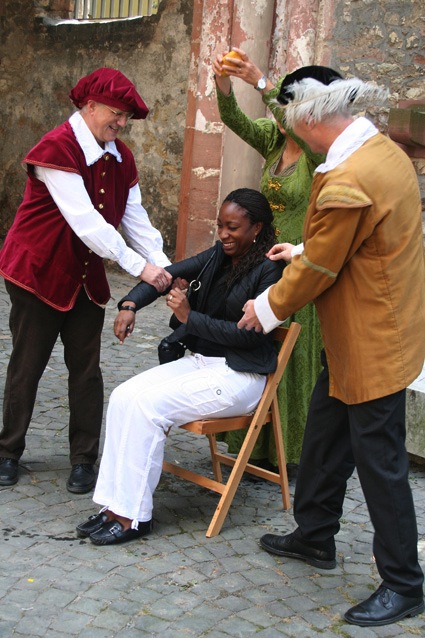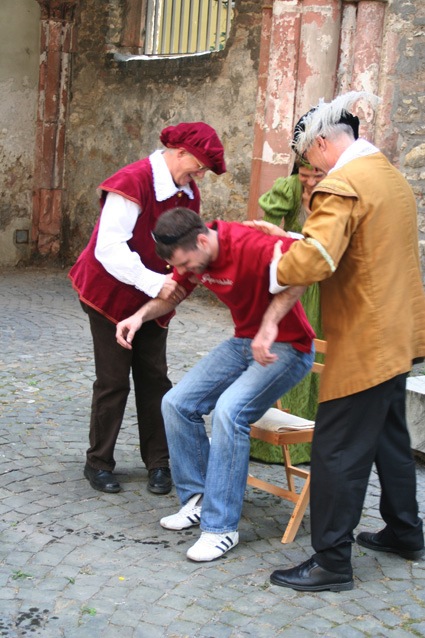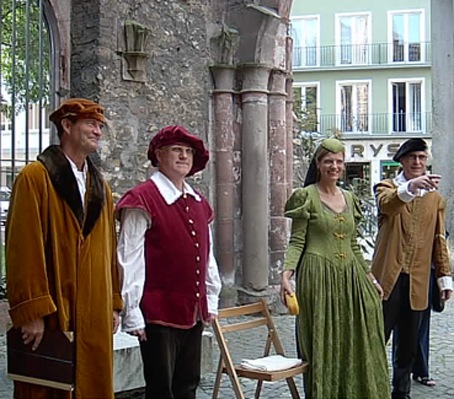
Gutenberg English draft
Moderator:
Good afternoon! This morning, you already learned quite a lot about the art of book printing and heard about the man who launched this "media revolution." In the course of the tour through the city, which Mrs. Dewald is conducting, we would like to tell you a bit more about this man, Johannes Gutenberg, and the world he lived in.
The ability to print on paper is also known as the "black art," obviously in reference to the color of the ink used to print books or periodicals. This term is used especially to designate the printer and the typesetter. Both professions required three years of apprenticeship, followed by at least two years of journeymanship. Until today, he study of printing and typesetting is completed by a ceremony known as the "Gautschen." Only after this ceremony, those who had completed the training could call themselves "Young men of the black art," "Black artists," or "Gutenberg's disciples."
Just what this "Gautschen" involved, we will personally experience at the end of this presentation. So much for starters: it is a crude joke!
But first we want to take you into the period Gutenberg lived in.
Sebastian Plumehand (the city historian speaks up):
"It would be best if I were to do that!"
Moderator: (a bit irritated, keeps on talking):
“It is now 600 years since he was born. “
Sebastian Plumehand (comes forward):
“My name is Sebastian Plumehand -- plumehand -- like plume and hand, and I am the only one who can report exactly how Gutenberg lived in Mainz. No one knows as much about this city as I do. I was in fact the historian of Mainz. A very important indispensable office."
Moderator::
“Do you want to give us a report on yourself, or about what life was like in Mainz back then?"
Sebastian Plumehand:
“Don't interrupt me! (opens an old book) - Here it is written that -- oh, just a minute, I have to find the page referring to the year 1400.” (looks here and there but does not find the page he wants. Meanwhile the moderator goes on.)
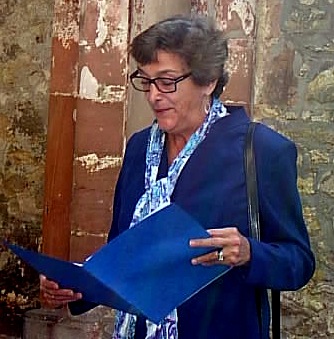
Moderator:
The precise date of birth of Gutenberg is not known. It is assumed that Johannes Gensfleisch -- that was the family name -- came into this world here in Mainz in 1400. Since he was born in the Gutenberg court, he took the name Johannes Gensfleisch von Gutenberg, according to the custom of the time, but nowadays, we drop the name Gensfleisch completely.
His parents were well-to-do citizens, members of the bourgeoisie. In the Middle Ages, such families were known as patricians.
The patricians enjoyed special privileges in the city. Along with the noble families and the powerful representatives of the church, they were the third power in regional structures.
At the same time, craftsmen guilds grew up in the cities. They, too, demanded rights like those the patricians enjoyed.
Mainz had reached the highpoint of its cultural development at the beginning of the 15th century. Many military conflicts among the princely powers had exhausted the city. In order to deal with the threatened economic collapse, the free cities had come together in associations. Mainz was associated with 40 other cities in the Rhine association. Nevertheless, taxes were a burden for the citizens, and in Mainz, there was also a conflict between two Archbishops, who vied for power. One of them, supported by the Emperor, organized the guilds and associations behind him; another, supported by the Pope, gathered the patrician families in his support. This led to civil war like conditions.
So, we are dealing here with a very turbulent historical period, the transition between the Middle Ages and the modern era. The precursors of the Reformation had already begun to announce a change which would lead to a break within the church.
In the neighboring countries, the situation was also becoming dramatic:
In 1415, the 100-year war between England and France flared up again.
In 1431, the famous Jeanne d'Arc was subjected to a trial by the Inquisition, and was executed.
In 1434, Cosimo de Medici won political control over the city of Florence and Brunelleschi completed the construction of the Cupola on the Cathedral.
In 1453, Mohamed II conquered Constantinople (today Istanbul).
But let us now follow the tracks of our discoverer of the art of printing with movable type.
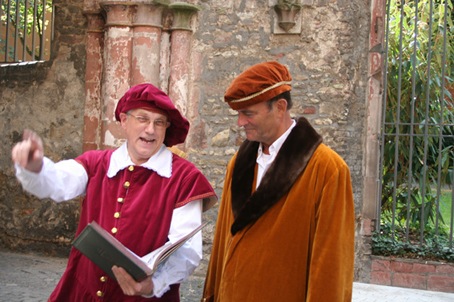
Sebastian Plumehand:
“Here, I've found it! (he points proudly at his book). "The Mainz patrician families liked to send their sons to the University in Erfurt. Erfurt, which was 300 kilometers away, belonged to the Mainz Archbishopric.
An entry in the matriculation register shows that Gutenberg studied at the University of Erfurt from 1419 – the year of his father's death -- to 1420.
In 1428, due to the desolate financial situation of the city, further conflict broke out between the patricians and the craftsmen's guilds. Out of protest against the tax demands of the guild-dominated city council, numerous patrician families abandoned the city, among them Gutenberg and the Gensfleisch family. They fled to the other bank of the Rhine, in Eltville, where the Gensfleischs' relatives had a villa.
In 1433 Gutenberg's mother died, and Johannes moved a year later to Straßburg, which, like Mainz, was a member of the Rhine city association.
Gutenberg worked from 1434 to 1444 as a goldsmith and clerk in Straßburg.
We have learned something about his private life, from certain court records.
In 1436, in fact, he was called before the religious court in Straßburg: the patrician's daughter Ennelin von der Isern Türe hat brought a suit against him, for not having respected an engagement.
Moderator:
Here you will see a short scene, which takes place in the court of the family of the Isern Türe.
SCENE-1:
(in Strassburg – Ennelin von der Isern Türe (E), alone)
E: (alone, picking the petals from a daisy)
He loves me, he loves me not.... (picking more quickly)
He loves me! He loves me!- loves me!
(she holds the flower in her hand, with still some petals on it)
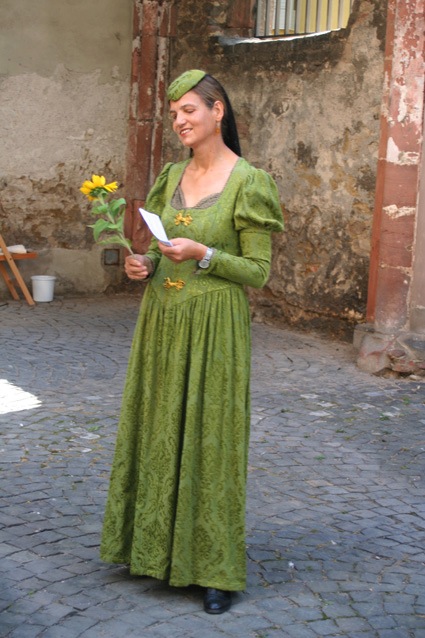
As he appeared to us every other day, marvelous, imposing and with keen eyes.
How he tried to catch sight of me secretly -- while talking to my father.
How he greeted me, when he walked through the courtyard to the warehouse.
How he addressed trusted words to me so often.
How he traded secrets with my father.
How they glanced at me, furtively and laughing.
They were certainly talking about a wedding day -- ah! when will he finally make it known?
In my mind I made already a thousand plans for the wedding party: Whom should we invite? What should I wear? How should I have my hair done? Me, the wife of a master, a scientist, a businessman, a discoverer! All my friends will be green with envy!
Soon I would be a woman who had "arrived"!
(she begins to pluck the last petals of the flower)
He loves me, he loves me not, not - not - not not!
(She throws the flower to the gorund and tramples on it.)
How could he deceive me? How could he cheat me?
He only wanted to sell these religious mirrors. He produced 7000 of them in Straßburg! Of course -- he only wanted to store these shiny metal pieces in our place.
No one was supposed to know what he was preparing.
Sold in Aachen, these religious toys yield a hefty sum of money for him.
O thou wretched scoundrel!
O thou German oaf!
Thine secretiveness with my father served only to store thine wares.
To harm my feelings so. – Thou hast made me the mockery of the city.
Only for a convenient place for these damned mirrors!
Thou petty-minded. Thou … German slanderer!
You should pay for this, Herr Johannes Gutenberg!
You will pay for this humiliation. Me, the daughter of the respected citizens of the Isern Türe, to bring such shame on me. I will haul you in front of a court, that is the only way I can restore my reputation. This will cost you the proceeds in Aachen.
You marriage swindler!
Moderator:
We find further signs of life in a protocol of a court proceeding three years later, in 1439, this time in front of the Straßburg council.
According to the court records, Gutenberg was involved, with several other citizens in Straßburg, in producing religious mirrors for the big pilgrimage to Aachen. But there is also mention of a printing press and printing material, which leads us to conclude that Gutenberg was already making his first practical experiments with printing, during his Straßburg period.
It is only in 1448 that we find the next lead. Now he is in Mainz, where he wants to set up a printshop. The following scene portrays the decisive meeting he had with a financier.
SCENE-2:
Scene: (Gutenberg back in Mainz 1448)
Persons:
Johannes Gensfleisch zu Gutenberg (G)
Johannes Fust (F)
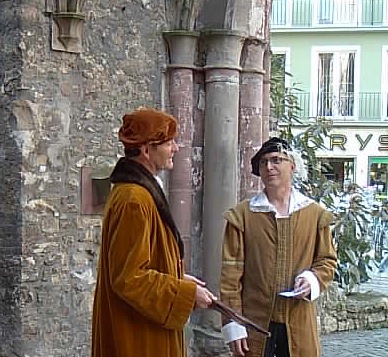
G: (allein, breitet die Arme aus und grüßt die Stadt)
Welcome Mainz – you free city on the German Rhine! To live here again, to work, what a promising future, as a free man in this free city!
(mehr zu sich sprechend)
Straßburg is behind me – Ah, Straßburg, thy women are domineering and quarrelsome!
That “Ennelin von der Isern Türe,” goes to court, to get money out of me to put together her dowry.
For my part, I hope now that I can reach my grand purpose here in my home town. And the women in Mainz are certainly friendlier; in fact, they talk here about the “Goldisch Määnzer Mädche” -- the golden girls of Mainz.
(ans Publikum)
Yesterday I visited a couple of bankers, to get a loan to finance my discovery. No way: the risk was too great for them! They shy away from any investment in an innovative technology. Ah, if only these scardy cats could understand how many advantages my method of printing books will have!
(er will gerade weitergehen, als ihn ein Patrizier anspricht, der ihn
zuvor beobachtet hatte)
F: Is it really you? Gutenberg! - I thought you were in Straßburg.
What's new? Are you still pregnant with the discovery of printing?
(G freudig überrascht, Fust beide Hände reichend)
G: By holy St. Martin, here in the shade of the Cathedral – where else - St. Martin must have led you to cross my path here. Fust, it is heaven that sent you here!
F: So, it sounds as though you are really happy to see me. Let me guess: have you financial problems? Are the banks refusing to give you loans for your discovery?
How far along are you with it? Speak openly! You know that I am not unaware of your enterprise.
G: Let's say this: Most of the problems have been overcome. Now I need a functioning workshop with a foundry, a printing press, paper production equipment and a couple of experienced workers.
F: That means you need money.
G: Yes, damn it!
F: So come to my office and we can discuss the whole matter there. Take care, I have to go visit a friend, who has just become the mayor of Mainz....
(Fust verabschiedet sich, reibt sich die Hände – G bemerkt nichts davon)
G: Fust, will he be my savior? I don't trust him completely, he understands the meaning of my discovery too well. I have to act and negotiate very carefully. My lawyer should accompany me tomorrow.
Moderator:
Already when Gutenberg moved to Mainz, he had taken out a loan of 150 gilder. Following this meeting in 1450, the Mainz lawyer Johannes Fust gave him a loan of 800 gilder and demanded, as collateral, the whole printing house with all materials and printed works. Two years later Gutenberg was in financial straits again and received again 800 gilder – this time on condition that Fust would become a partner in the enterprise.
The repayment was to occur after the successful and flawless printing of the first Bible.
Gutenberg put the money into the realisation of his discovery: running a printing shop and paying all his employees.
In 1455, he was finally in reach of his goal. His discovery functioned perfectly and he began work in his workshop on the first series of the Bible, the socalled Gutenberg Bible, with 42 lines per page.
The next scene shows the main people involved in the decisive year 1454:
SCENE:
(Gutenberg succeeds in printing the Bible – Fust wins the trial)
(Beide in der Szene, aber jeder für sich!)
Persons:
Gutenberg (G)
Fust (F)
G: I've done it!
The first flawless copy of the Holy Bible is coming out of my printshop.
F: I've done it!
The workshop with all equipment and materials is in my possession!
G: Over 20 years of development work lies behind me. With this method for printing books, a new epoch has begun.
F: Almost 2 years of dispute are behind me. It was a tough job, this trial against Gutenberg. A rich future as a publisher lies ahead for me.
G: I have solved all the problems related to the modern printing of books.
The alloy for the letters is just right.
The fits are even and do not tear the paper any longer.
I have discovered the right paper thickness and stability.
The ink has a good cover, does not smear, and dries fast.
The printing press is fast and produces an even print.
The placement of the paper is precise – one page goes in like the other.
I can even process expensive parchment.
Books can be bound without any disruptions.
My discovery will change the world!
F: My "friend" Gutenberg has solved every technical problem.
The enterprise was ripe for takeover and the formulation in the loan contract was very cleverly chosen.
It offered ample freedom of interpretation.
I saw the product as flawless and finished, and with that the repayment date was reached.
But Gutenberg wanted to make the Bible still better, even more beautiful, more perfect.
But not at my expense.
It was good luck that the Mayor supported my view in the trial.
From now on, it will be in my publishing company that the Bibles -- and all other books -- will be printed AND sold - Gutenberg is in love with his art, it's up to him.
Moderator:
Johannes Fust demanded 2020 gilder for his loan plus interest, a sum with which one could have bought up a street with 25 houses. This trial was the result of a dispute between Gutenberg und Fust, regarding the quality of the Bible. Gutenberg was not yet satisfied with the Bibles that had been printed and wanted to have them destroyed. Fust saw his capital investment in danger and wanted to sell the Bibles, since he considered the quality adequate.
Now Gutenberg had to sign over not only the printing shop to Fust, but also part of the Bibles. A series of 180 Bibles printed on parchment had been planned, and 30 were already ready. To print them, Gutenberg used 290 characters which he had produced from an alloy he had developed himself. The printing was done on six presses simultaneously.
Fust:
“Yes, I got not only the printshop, but also half of the already printed Bibles. With Peter Schöffer, one of Gutenberg's best people, I ran the printshop under the name Fust & Schöffer beginning in 1456, and with great success.
By the way, I'm also one of the founders of the Frankfurt Book Fair. In 1462, I started buying and selling books in Frankfurt. That year can be considered rightly as the founding year of the Frankfurt Book Fair.”
Moderator:
Gutenberg, however, could not abandon printing and went on to make further discoveries: in 1457, the first three-color printing was prodcued in his printshop, and another one in 1459.
Yet, his work was threatened with disaster again, through the “Mainzer Stiftsfehde (Mainz Bishops Feud) of 1462.”
This was again a feud between two candidates for the Mainz Bishop's seat. The candidate of the Kaiser (Emperor) was not to the liking of the Pope. The Papal candidate had the city conquered. Mainz was destroyed and many citizens beaten to death. Along with other citizens, Gutenberg was banned from Mainz for the second time. Luckily, he was able to take his new type stamps with him.
He found accomodations in Eltville, where his mother's family lived. There, a newly established printing enterprise "Bechtermünze" opened, but Gutenberg was not financially involved. Perhaps he had something like a consultancy contract. (Bechtermuenze, by the way, still exists today, as a vintner's locale, with excellent wine.)
Gutenberg:
“But already a year later, I was allowed to return to Mainz.
I even received a generous pension from the new Mainz Bishop and was named a man of the court. With this, I received not only grain, clothing and wine supplies for the rest of my life, – over 2000 liters of wine a year - , but I was also exempted from paying taxes.
Unfortunately, I could enjoy the newly won dignity only three years, since I died on February 3rd, 1468 at about the age of 70.”
Moderator:
Gutenberg's revolutionary idea rested on separating out the component parts of a text, like characters, punctuation marks, spaces, and so on. The characters or letters, which were produced in reversed form, were cast out of an alloy made of lead, tin, and further components and could be re-used again and again. Gutenberg's printing process saved work, time, and created new freedom. Texts of all sorts could be easily reproduced in a short period of time. That was the beginning of the era of mass media.
Gabriele:
So much for Gutenberg and his discovery, life, and work in this old venerable city.
Since you have learned so much about the "Black Art," your apprenticeship as a printer or typesetter has been completed. You will now take part in the concluding examination ceremony.
As announced at the beginning, you will now be "gegautscht"!
Originally, the term "Gautschen" designated the first drainage step in the production of paper, when the freshly made sheets were taken off the filter and placed on a large felt mat.
The socalled "Gautschen" is an old practice in book printing, which seems to have first appeared in the 16th century. After having passed their exams, the apprentices would be dunked in a tub -- filled to the rim with cold water -- or, set on a large, damp sponge. Putting up resistance was useless: the apprentice had to get wet.
(Jetzt wird einer nach dem anderen auf einen Stuhl mit einem nassen Schwamm
gesetzt - natürlich nicht wirklich. Der Lehrling steht vor dem Stuhl, wird von
zwei Dichterpflänzchen auf die Sitzfläche gedrückt und dabei wird der nasse
Schwamm mit einem trockenen Handtuch vertauscht. Aber ein bisschen nass
gespritzt werden sie schon!).
Gutenberg:
( als Gautschmeister, spricht folgenden Spruch dazu)
"GET GOING!
LET HIS CORPUS POSTERIORUM FLIP
ONTO THIS DAMP SPONGE / TIL BOTH BUTTOCKS DRIP.
GIVE THE THIRSTY SOUL A GLASS OF WINE --
FOR GUTENBERG'S SON, THIS BAPTISM IS FINE."
(Nach dem Gautschen wird jedem Teilnehmer ein “Gautschbrief” überreicht, der an
diesen Tag mit Gutenberg in Mainz erinnert.)
